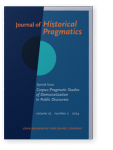A diachronic corpus-pragmatic approach to democratization
The evolution of newspaper editorials, 1860–1979
Democratization is often invoked as an explanatory factor for diachronic linguistic developments. We believe that
at the root of democratization often lies the pragmatic negotiation of power relations, whereby a more democratic use of language
can reduce the distance between addresser and addressee. This article examines the evolution of power relations in the New
York Times editorials from 1860 to 1979 as represented in COHA. After a quantitative analysis of the evolution of
three pragmatic variables that index democratization, the study offers a qualitative analysis with the aim of anchoring them to
the situational context of newspaper editorials, especially regarding the power relations negotiated in this register over time.
This paper also examines the impact of socio-historical events on the evolution of power relations and shows that they are
intimately linked.
Article outline
- 1.Introduction
- 2.Background
- 2.1Modal and semi-modal verbs
- 2.2Contractions
- 2.3Passive voice
- 3.Corpus, methodology and general results
- 3.1(Semi-)modals
- 3.2Contractions
- 3.3Passives
- 4.Results
- 4.1Modals and semi-modals
- 4.2Contractions
- 4.3Passives
- 5.Conclusion
- Acknowledgements
- Notes
-
References
-
Corpora
